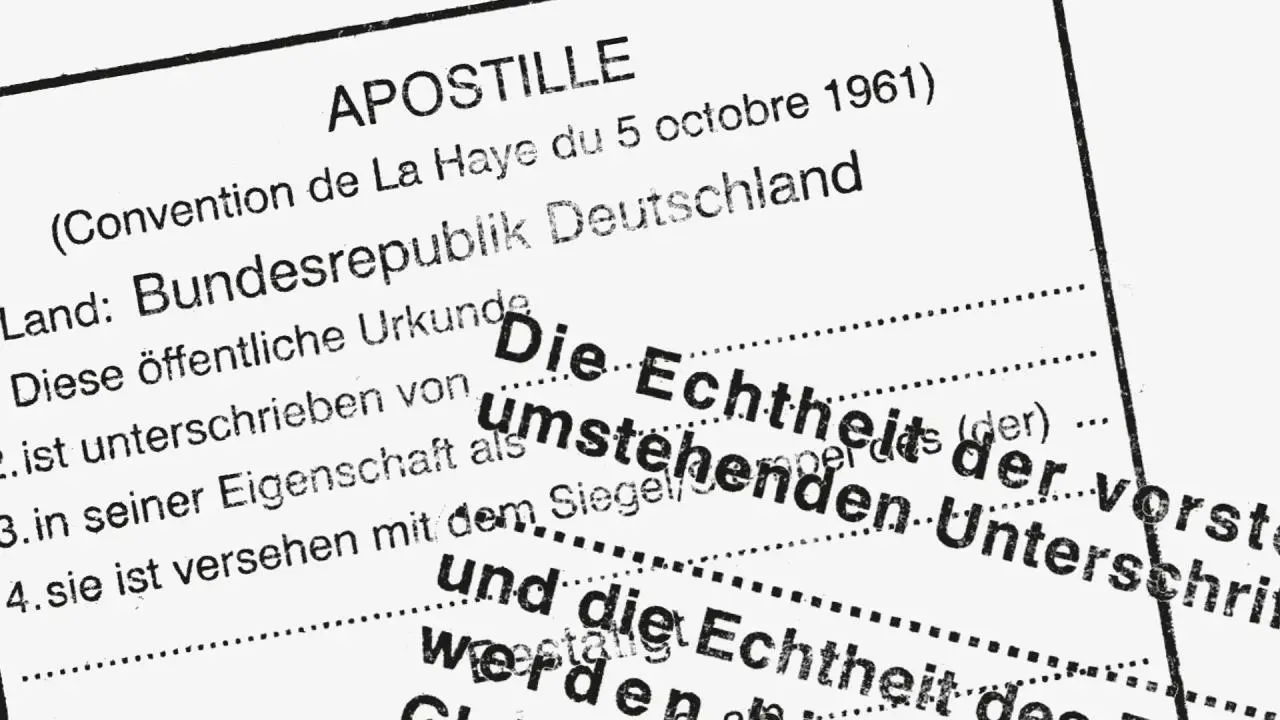
International document usage
If you want to use documents abroad, you often face the challenge of having them officially certified. For a document or certificate to be recognized in another country, its authenticity must be verified. Depending on the target country, a document must be apostilled or legalized.
Our company, ReSartus, can help you prepare your documents so that they are properly translated – however, please note that we are a translation agency only. Our job is to translate your documents professionally. The necessary apostille or legalization must already be on the original document before translation. We have compiled information on how to apply for this for individual countries in the FAQs for many languages.
What is an apostille?
An apostille is a simplified form of authentication of documents and is used between countries that have signed the Hague Convention of 1961. An apostille is issued by a competent authority to certify the authenticity of the signature, the capacity in which the signatory has acted, and, where applicable, the authenticity of the seal or stamp affixed to the document.
Typical documents that can be apostilled are civil status documents (birth, marriage, or death certificates), diplomas, criminal records or court judgments. Different authorities are responsible for issuing apostilles: civil status documents are certified by the regional councils, district governments, or their subordinate authorities, while diplomas are usually certified by the ministries of culture or education. Criminal records receive their apostille directly from the Federal Office of Justice. For a number of documents, we have already compiled a list of the relevant higher authorities elsewhere.
What is legalization?
Legalization is a procedure for confirming the authenticity of documents and is used between countries if one of them is not a signatory to the Hague Convention or if one country does not recognize the other’s accession to the convention. In this case, the authenticity of a document is confirmed by a diplomatic or consular representative of the target country.
The process is more complex than with an apostille: First, the document must be pre-certified by a German authority, then certified by a higher authority (such as a regional council or a ministry), and finally certified by the Federal Foreign Office in Brandenburg. Only then does the actual legalization take place at the embassy or consulate of the foreign country in question. In some cases, the Ministry of Foreign Affairs in the target country must then confirm the validity of the legalization.
An example: If a German university degree is to be used in a country such as the United Arab Emirates, it must pass through this multi-stage certification chain consisting of pre-certification, over-certification, final certification, and legalization.
Which of the two is needed?
Which countries require an apostille and which require legalization depends on whether the country is a signatory to the Hague Apostille Convention. An up-to-date list of these countries can be found on the website of the German Federal Foreign Office.
Countries such as Canada, China, and the US accept an apostille, while countries such as Egypt, the United Arab Emirates, and Vietnam usually require legalization. Some countries, such as India, Azerbaijan, and Pakistan, are officially part of the Apostille Convention, but this is not recognized by Germany. Legalization is therefore still required in these cases.
For EU countries, apostilles have not been mandatory since 2016, but are still possible. The decision on whether an apostille is required is made on a case-by-case basis by the local authorities. Some countries no longer require any verification of authenticity.
Which countries do not offer legalization at all?
In some countries, legalization is not possible due to the political situation or the high number of forged documents. German authorities are aware of this problem and often waive the legalization requirement. Please check this on a case-by-case basis on the website of the respective German embassy and speak to the authority to which you wish to submit the documents.
For the following countries, it is not possible to legalize German documents for use abroad or foreign documents for use in Germany (as of May 2025):
Afghanistan, Central African Republic, Chad, Cuba, Djibouti, Equatorial Guinea, Eritrea, Gabon, Iraq, Liberia, Niger, Sierra Leone, Somalia, South Sudan, Sudan, Tajikistan, Turkmenistan, Yemen.
Which countries veridy authenticity through administrative assistance?
In some countries, legalization is only possible to a very limited extent. Instead, the authenticity of documents is verified through alternative procedures such as administrative assistance, or the German authorities are aware of the problem and waive the legalization requirement. Please check this on a case-by-case basis on the website of the respective German embassy and speak to the authority to which you wish to submit the documents.
For the following countries, the legalization of German documents abroad and foreign documents in Germany is replaced by other procedures such as administrative assistance (as of May 2025):
Bangladesh, Benin, Burundi, Cameroon, Congo (Democratic Republic), Congo (Republic), Côte d’Ivoire (Ivory Coast), Ethiopia, Gambia, Ghana, Guinea, Guinea-Bissau, Haiti, India, Kenya, Laos, Madagascar, Mali, Mongolia, Mozambique, Myanmar, Nepal, Nigeria, Pakistan, Sri Lanka, Togo, Uganda, Uzbekistan.
Which countries partially offer legalization?
In some countries, legalization is only possible for certain documents and certificates. These are often civil status documents such as birth and marriage certificates. For other documents, there are often alternative procedures such as administrative assistance, or the German authorities are aware of the problem and waive the legalization requirement. Please check this on a case-by-case basis on the website of the relevant German embassy and speak to the authority to which you wish to submit the documents.
For the following countries, legalization is required for the use of German documents abroad and foreign documents in Germany, but this is only possible to a limited extent (as of May 2025):
Algeria, Cambodia, Dominican Republic, Kosovo, Libya, Philippines, Syria, Tunisia, Zambia.
Which countries offer legalization?
The following countries are not signatories to the Hague Apostille Convention. Accordingly, legalization is required and possible for the use of German documents abroad and foreign documents in Germany (as of May 2025):
Angola, Benin, Bhutan, Burkina Faso, Comoros, Egypt, Greenland, Iran, Jordan, Kiribati, Kuwait, Lebanon, Malaysia, Maldives, Mauritania, Micronesia, Nauru, Palestine, Papua New Guinea, Taiwan, Tanzania, Thailand, Tokelau, Turkmenistan, Tuvalu, Uganda, United Arab Emirates, Vietnam, Zimbabwe.
In which countries is legalization necessary because their apostilles are not accepted in Germany?
The following countries are signatories to the Hague Apostille Convention, but Germany does not recognize this. Accordingly, legalization is required for the use of German documents abroad and foreign documents in Germany (as of 05/2025):
Azerbaijan, Moldova, Morocco, Rwanda, Senegal.
Which countries require an apostille?
The following countries are signatories to the Hague Apostille Convention and are recognized as such by Germany. Accordingly, an apostille is required for the use of German documents abroad and foreign documents in Germany (as of May 2025):
Albania, Andorra, Antigua and Barbuda, Argentina, Armenia, Australia, Bahamas, Bahrain, Barbados, Belarus, Belize, Bolivia, Bosnia and Herzegovina, Botswana, Brazil, Brunei Darussalam, Canada, Cape Verde, Chile, China, Colombia, Cook Islands, Costa Rica, Dominica, Ecuador, El Salvador, Eswatini, Fiji, Georgia, Grenada, Guatemala, Guyana, Honduras, Iceland, Indonesia, Israel, Jamaica, Japan, Kazakhstan, Kyrgyzstan, Lesotho, Liechtenstein, Malawi, Marshall Islands, Mauritius, Mexico, Monaco, Montenegro, Namibia, New Zealand (except Tokelau), Nicaragua, Niue, North Macedonia, Norway, Oman, Palau, Panama, Paraguay, Peru, Russia, Samoa, San Marino, Saudi Arabia, Serbia, Seychelles, Singapore, St. Kitts and Nevis, St. Lucia, St. Vincent and the Grenadines, South Africa, South Korea, Suriname, Tonga, Trinidad and Tobago, Turkey, Ukraine, Vanuatu, Venezuela, United Kingdom (including overseas territories), United States.
In which countries is an apostille possible?
The following countries are signatories to the Hague Apostille Convention and are recognized as such by Germany. However, you should always check with the relevant authority to find out whether you actually need an apostille. An apostille is no longer required for the use of German documents in other EU countries or for the use of foreign documents from EU countries in Germany, but is still possible (as of May 2025). This applies specifically to:
Bulgaria, Croatia, Cyprus, Czech Republic, Estonia, Finland, Hungary, Ireland, Latvia, Lithuania, Malta, Netherlands, Poland, Portugal, Romania, Slovakia, Slovenia, Spain, Sweden.
Which countries require no formalities anymore?
Due to bilateral or multilateral agreements, no formalities are required for documents from the following countries (as of May 2025):
Austria, Belgium, Denmark (except Greenland), France, Greece, Italy, Luxembourg, Switzerland.
Over-certification of translations
Please note that when using German documents abroad, they often require a certified translation accompanied by an additional over-certification — very few German authorities issue documents in English, for example. The certified translation itself can be over-certified by the higher regional court or district court where the translator was sworn in or authorized. This over-certification confirms that the translation was done by an officially recognized translator.
It is essential that you contact the relevant authorities in the target country to find out what requirements apply to the translation and its certification. This is because certified translations are only recognized in Germany if the translator is sworn in Germany. A translation produced abroad will not be accepted in Germany, even if the translator is sworn in, for example, for the courts in Spain, Serbia, or Syria.

Between Deadlines and Diplomacy


Why localization is more than translation

60th Theodor Heuss Prize
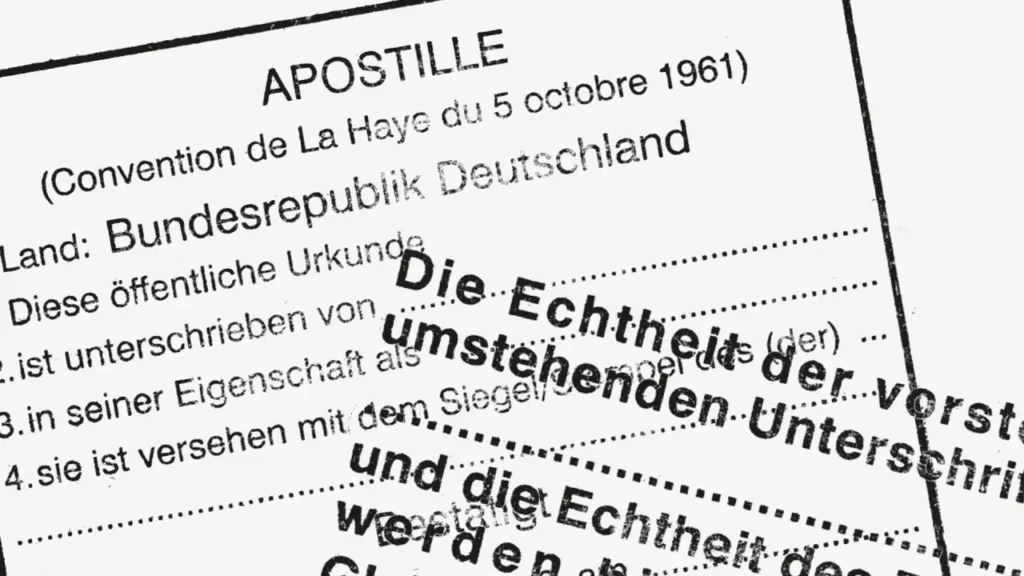

The invisible danger: digital translation fraud

Planned revision of the JVEG

Freelancer visa in the UAE

Emigration to Dubai

Cuts and restrictions – Interpreters and Translators in Crisis

Building bridges at the Wilhelm Bock Prize

Funding Programs for Language Mediators in Healthcare

Inclusion in Education: ReSartus Enables International Exchange

The Future of Remote Interpreting – Virtual Conferences


Industry-specific challenges in the translation industry

The Role of AI in the Translation Industry

Hiiios – The video interpreting service by ReSartus

Emigrating from Germany

ReSartus supports the 43rd Erlangen Poetry Festival

Preparations for the COP 28 World Climate Conference
Example 1: Apostille for Ukrainian documents
Assume you have gotten divorced in Ukraine, applied for a certificate of good conduct, or obtained a (university) degree and would like to use it in Germany. Ukraine is part of the Apostille Convention and is recognized as such by Germany. First, check with the German authority (e.g., registry office, university examination office) to see if they require an apostille.
If so, you must apply for an apostille at the relevant higher authority, depending on the type of document. You can find the right contact details on the website of the German Embassy in Ukraine. Once the apostille has been affixed, a certified translation of the document and apostille must be provided. This must be done by a translator who is sworn or authorized in Germany, which we are happy to do for you. You can now use the document in Germany.
In short:
- Check whether an apostille is required in Germany
- Apply for an apostille abroad
- Order a certified translation of your documents and apostilles in Germany
- You can now use your translated documents
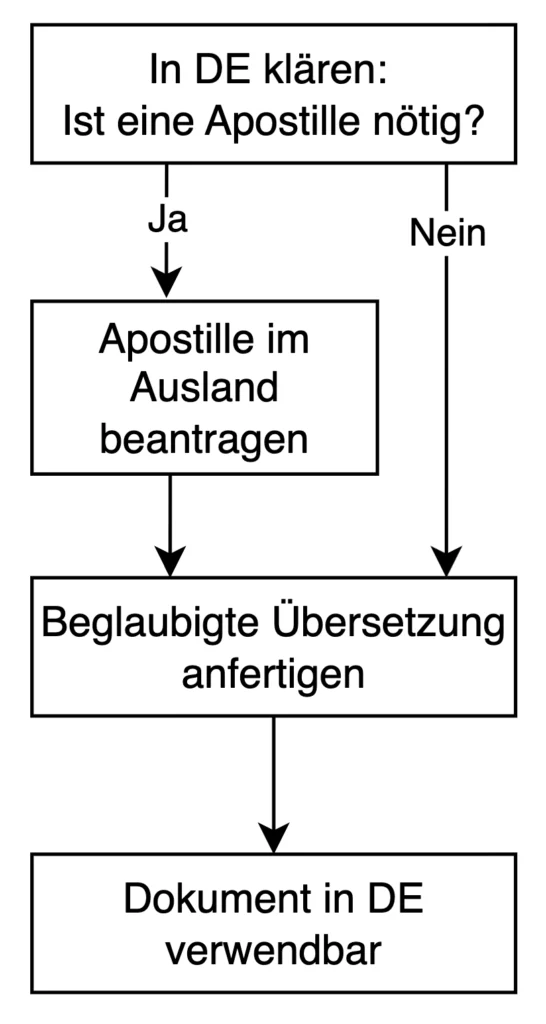
Example 2: Apostille for German documents
If, conversely, you want to use a German divorce decree in Ukraine, for example, the process is similar. First, check whether the Ukrainian authorities require an apostille. A divorce decree is usually issued by a local court. This is subordinate to a higher regional court. You can usually find out which court is responsible by searching online. Send the original documents, or better still certified copies, to the higher court together with an application for an apostille. Then have both the documents and apostilles translated, which we are happy to do for you.
The certified translation must then be over-certified. To do this, send the certified translation together with an application for over-certification to the court where the translator was sworn in. This is usually stated in the translator’s certification note or stamp. However, we will be happy to provide you with this information. Some courts have their own forms, others do not. In such cases, you can either write a letter yourself or use our sample application for over-certification. Once the translation has been over-certified, you can use the document abroad.
In short:
- Check whether an apostille is required abroad
- Apply for an apostille in Germany
- Order a certified translation of your documents and apostilles in Germany
- Have your translation over-certified
- You can now use your translated documents
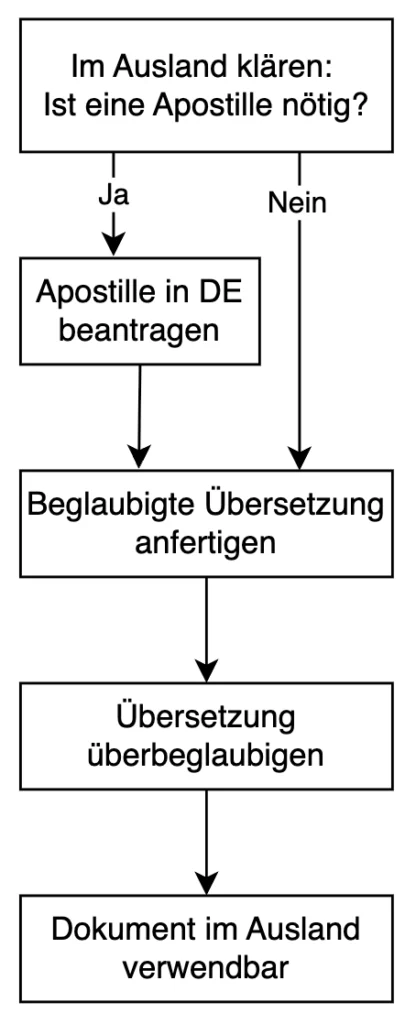
Example 3: Legalization for German documents
Assume you want to use your university degree in the United Arab Emirates (UAE). In this case, you must go through the regular legalization process. To do this, you must have your degree pre-certified by your university. Ideally, you should ask your university for a certified copy of your degree, including your transcript. You then have this certified copy over-certified by the Ministry of Culture or Education responsible for your degree for use abroad. This is followed by final certification by the Federal Foreign Office in Brandenburg. Once all steps have been completed by the German authorities, the certified translation of the documents, including legalization, is carried out in one of the official languages of the destination country, followed by the over-certification of the certified translation. In the UAE, this is currently possible for Arabic and English, which we are happy to do for you.
After that, the foreign mission of the target country must confirm the accuracy of the final certification. In this case, that would be the UAE Embassy in Berlin or the Consulate General in Munich. Finally, the Foreign Ministry in the target country, in this case the UAE, must usually confirm the accuracy of the legalization by the foreign mission. Then you can use the document abroad.
In short:
- Check whether legalization is required abroad
- Apply for pre-certification
- Apply for over-certification
- Apply for final certification
- Order a certified translation of your documents and legalizations in Germany
- Have your translation over-certified
- Have legalization confirmed by the foreign mission
- Have legalization confirmed by the Foreign Ministry in the target country
- You can now use your translated documents
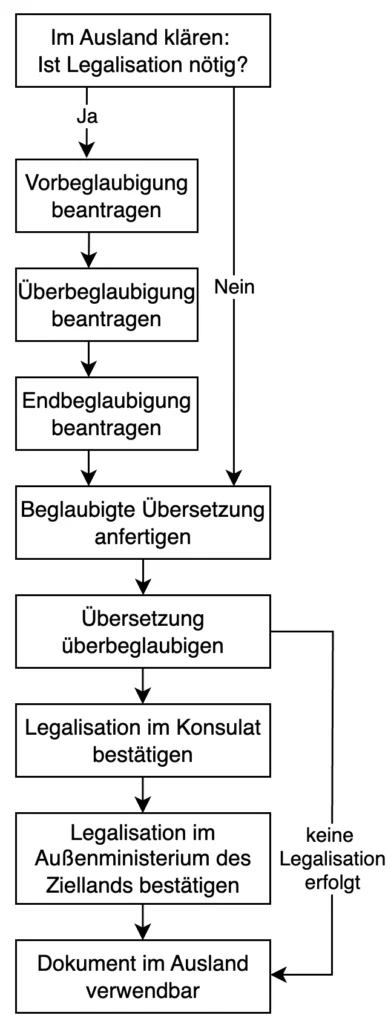
To ensure that your request is successfully processed, we recommend that you seek advice at an early stage and provide us with the relevant documents and information about the target country. This will enable us to ensure that your documents are translated accurately and prepared for further processing.

Between Deadlines and Diplomacy


